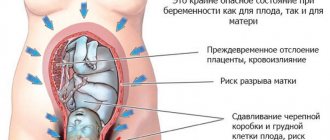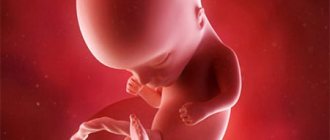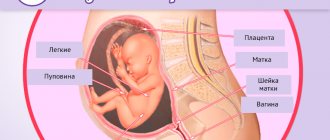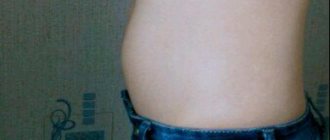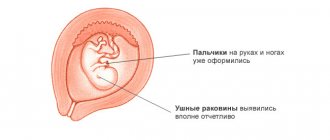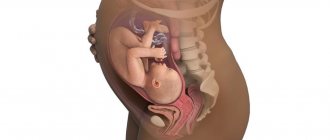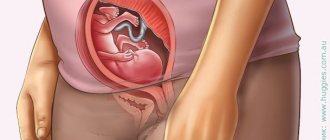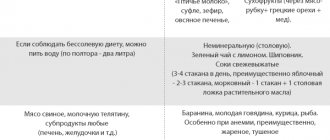After crossing the 37-week mark of pregnancy, the baby developing in your tummy is considered full-term. This means that until the end of this week you must treat your health with caution - let it grow.
The task assigned to your body is almost completed, all that remains is to give birth. By this moment, all the main close-ups must be completed - the child’s room has been prepared, a crib and stroller have been purchased, things for the maternity hospital have been collected, a course of lectures has been completed.
Put off long trips; in the last weeks of pregnancy it is better not to go far from home - childbirth may catch you at the most inopportune moment.
Fetal development
The baby is just waiting in the wings - he is fully matured and the 37th week is needed only for the finishing touches - he continues to gain weight.
The baby's skin is pink, covered with lanugo only in the area of the shoulder blades and lower back. The hair on the head continues to grow, and by the time your miracle is born, it may have thick hair.
This is what your baby looks like at 37 weeks
The fingernails already extend beyond their edges, and the child can scratch himself.
Subcutaneous fat is deposited, especially in the face area, making the cheeks plump and the baby very cute.
Now your baby looks like a newborn.
The functioning of the brain improves, reflexes become stable - the sucking reflex is most pronounced, the baby sucks his finger during all his free time from sleep - this is how he prepares to receive food from your breast.
The child actively reacts to everything that happens, and the mother can even understand whether her child likes something or not.
The visual and auditory systems have fully matured, the child is ready to perceive and process information. Already now he hears, remembers and distinguishes the voices of his parents, the music that his mother listens to.
The child moves less and less - there is not enough space for him, and he only makes kneading movements.
Dietary rules for a woman at 37 weeks of pregnancy
The 37th week of pregnancy should be accompanied by proper nutrition. Nutrition should be complete, rational, balanced in proteins, fats and carbohydrates. A pregnant woman should receive the entire necessary set of vitamins and minerals from food.
At the 37th stage of pregnancy, expectant mothers should follow these simple recommendations:
- Limit the consumption of salty, smoked and spicy foods.
- Eat small portions, which helps facilitate the process of digestion and absorption of food.
- It is advisable to take dairy products 2 hours before going to bed to effectively prevent constipation. Dairy products are excellent sources of calcium. With this intake, calcium is absorbed better than when taking drugs from the pharmacy chain.
- Eat enough iron. This microelement is found in buckwheat porridge, pork and beef liver.
- Replenish the water-salt balance by drinking at least one and a half liters of clean water daily.
From the digestive system at 37 weeks of pregnancy, the following unpleasant sensations may occur: heartburn, constipation, pain in the right hypochondrium, flatulence.
Ultrasound at 37 weeks of pregnancy
Most often, ultrasound is prescribed at this time for women whose baby was in an incorrect position. It is clarified whether the child “changed his mind” and turned over.
In addition, this study determines the blood flow in the placenta, the size of the fetus, the degree of maturity of the placenta, and the amount of amniotic fluid.
Nutrition at 37 weeks of pregnancy
Many women experience real stress at 37 weeks, especially for those for whom this is their first pregnancy. How will everything go, how to overcome the pain, will there be any complications, who will the baby look like?.. This is what mothers think about in later stages. It happens that because of worries you don’t feel like eating at all. So treat yourself to all sorts of goodies - at week 37 you can already do this (in moderation, of course). “Eat up” your stress with delicious buns and sweet pies. But don't overuse it! As for the main menu, the basis of the diet at 37 weeks is still porridge with water, plant foods, fermented milk products (it is better to exclude fermented milk a week before the expected date of birth) and baked vegetables.
What happens in your body at 37 weeks?
Most expectant mothers are already tired by this time. They want to give birth faster, see their baby, hold him in their arms, put him to their chest.
The stomach may drop, and the problems of heartburn and shortness of breath will cease to bother you, but others may appear - frequent urination, the urge to defecate.
Training contractions continue, their frequency may increase slightly - most pregnant women already know how to cope with them by the 37th week, the main thing is not to confuse them with real ones
You may stop gaining weight - this is also one of the signs of impending labor.
What should a mother do at 37 weeks?
First of all, at week 37, you must pack your bag for the maternity hospital. Labor is just around the corner and could start as early as this week, so it's important to be prepared.
This week the woman will have to visit her doctor, who will conduct a full examination. At this time, the doctor assesses the condition of the cervix: to what extent it has softened and how much it has shortened, whether the mucus plug has come away, how much it has dilated. Although labor may not occur for a couple of weeks, once the plug comes out, the cervix opens a little. Normally, its dilation is considered to be up to 1 cm.
Also at the appointment, the doctor determines the location of the fetus and measures the width of the pelvis. Based on these data, he can prescribe a planned caesarean section for the woman. The main indications for this are: large fetus, narrow pelvis, breech presentation of the fetus weighing more than 3.6 kg, transverse position of the fetus. In the case of a planned caesarean section, the woman is hospitalized at 38 weeks, examined and operated on.
In the later stages, it is important to carefully monitor the woman’s sensations: the baby’s movements, vaginal discharge, and general well-being.
If you often begin to notice a stiffness in your abdomen, or pain in the lower abdomen from time to time, tell your doctor. This week the uterus may be toned, which often causes premature labor. This especially applies to those who will undergo a planned caesarean section.
If fetal movements become sluggish and you do not feel them for several hours, this is a reason to be wary and consult a doctor. The doctor will conduct a CTG of the fetus, from which he can draw conclusions about its condition. It is important to prevent hypoxia, because the placenta is aging and may no longer cope with the delivery of the required amount of oxygen and nutrients.
Abundant watery discharge may indicate leakage of amniotic fluid; this should also be reported to the doctor.
How you feel at 37 weeks
Don’t be irritated for no reason - the desire to give birth faster is inherent in many people, and from now on it will only increase. There is no need to rush time - the baby himself knows when it is better for him to see the light. If questions from others about your upcoming birth make you feel negative, take up auto training and spend more time among those who know and support you.
When the abdomen lowers, the child will approach the entrance to the pelvis and the pressure on the surrounding tissues will decrease - this will manifest itself as a feeling of relief.
You feel the baby's kicks less often, but more painfully. Sometimes there is a feeling of numbness in the limbs, which is associated with impaired microcirculation in the vessels.
Fetus at 37 weeks gestation
Great news this week - the baby is ready to be born! And although the time for childbirth has not yet come, they will no longer be considered premature if they come now. By this time, the child is ready to accept, assimilate and digest food: the mucous membrane of the stomach and intestines is lined with villous epithelium, which will absorb nutrients, the baby’s original feces - meconium - have already been formed, peristalsis is activated. The baby is able to suckle at his mother’s breast – he is already quite strong and has accumulated enough subcutaneous fat, thanks to which the skin is practically smoothed out. Heat exchange processes take place without failures, the baby will be able to retain and maintain body heat at the level necessary for life.
The born baby will already be able to breathe on his own, the lungs are sufficiently mature. In addition, at the 37th week of pregnancy, the hormone cortisone is produced in the small body, which brings the pulmonary system to perfection, that is, final maturation.
Birth will no longer be as stressful for the baby as it would have been before. The adrenal glands take care of this: they have greatly enlarged and produce a special hormone that helps the baby adapt to life outside the womb. As you can see, there is no longer any need to be afraid of childbirth, although the development of the child at 37 weeks of pregnancy is still ongoing.
The baby’s liver intensively accumulates iron: it will be needed to produce blood cells, which it will provide for the baby in the first year of his life.
The process of covering neurons with protective membranes responsible for the coordination of movements continues. The establishment of neural connections will last until childbirth and beyond - for a whole year.
Your baby at 37 weeks of pregnancy is absolutely unique: he has individual facial features, his own pattern on the skin has formed, his nails and hairs have grown (although it is quite possible that your miracle will be born bald), and the nasal and ear cartilages have hardened. The bones of the skull are still quite soft and elastic, because when passing through the mother’s pelvis, the head will be deformed. Two fontanelles remain completely open, which will close only a few months after birth. The lanugo fluff has practically disappeared from the body, as well as the birth lubricant, the remnants of which are collected only in the skin folds. The baby's head and tummy are now equal in circumference. Its size has already reached 48-50 cm and increases by an average of 1 cm every week, and its weight reaches 2,900 g. Of course, in this sense, all babies are different.
Discharge from the genital tract
At this time, the usual light discharge is mixed with mucus, which may contain a small amount of blood streaks. This is a mucus plug, which throughout pregnancy served as a barrier to the penetration of infection to the child. It begins to come off in small amounts 2 weeks before giving birth.
Purulent discharge must be eliminated as soon as possible - infection during childbirth is dangerous for both mother and child.
Bloody discharge is a reason to seek help, especially if it was preceded by an injury, a fall and is accompanied by pain.
Baby development at 37 weeks of gestation
At the thirty-seventh week of gestation, the baby’s body is completely ready for birth. All his systems can work outside the mother’s body, which means that if he is born at this particular time, he will be healthy and will be able to breathe, eat, grow and develop independently. Since there is practically no space in the uterus, the baby turns head down and awaits its birth. Due to limited space, the child practically does not move and spends most of his time sleeping, gaining strength before the stressful and difficult condition of passing through the birth canal.
At the thirty-seventh week of gestation, the baby weighs 2950 grams and adds 14 grams to its weight every day. His height is approximately 48 centimeters. The respiratory system and lungs have already finished forming, but they are not functioning yet, since this is not necessary. However, as soon as the baby is born and takes its first breath, the heart will begin to pump blood into the lungs, thus starting their work.
At this stage, the child practices breathing every day, making appropriate movements, while swallowing amniotic fluid. This process is clearly visible during ultrasound examination.
At the thirty-seventh week, the placenta begins to age. For nine long months, it regularly performed its protective and nutritional functions, which gradually led to its wear and tear. Now the child's place gives the baby less and less nutrients and oxygen every day.
Baby's internal organs
Despite the fact that the baby’s bones have become strong and the skeleton has fully developed, the bone structures of the skull remain soft and elastic. This is necessary so that the baby’s head can pass through the birth canal without injury to the child and mother.
All organs of the gastrointestinal tract are already ready to digest and assimilate food, so intestinal motility begins to increase. The baby swallows the amniotic fluid along with the particles it contains. They are digested and turn into meconium, which the baby will excrete in the first few days after birth.
The child's hearing and vision are well developed, and the brain, together with the central nervous system, controls the baby's movements, making them meaningful and coordinated.
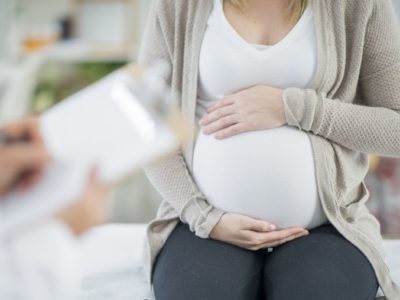
Photos of bellies at 37 weeks
Pain at 37 weeks of pregnancy
The release of the mucus plug before childbirth is often preceded by a nagging pain in the lower abdomen. Along with other signs, it indicates that the due date is approaching. The baby presses on the perineum, the pelvic bones soften and gradually move apart, so here, in the lower abdomen and pubic area, the woman feels pain and heaviness. Often shooting pains at the 37th week of pregnancy radiate to the legs, especially when walking.
But if the tummy has dropped, then the pain in the hypochondrium has already disappeared or at least decreased: the baby no longer reaches his legs so high. But training contractions can become a little painful.
My back, lower back, sacrum, and legs still hurt quite a lot and ache. The baby is already heavy and continues to gain weight, and you are also getting heavier - the load on the bones and musculoskeletal system in the last weeks of pregnancy is enormous!
Weight
A heavier baby, amniotic fluid, placenta, large volumes of blood, breasts and your own fat reserves undoubtedly affect your weight at 37 weeks of pregnancy. Since the beginning of pregnancy, you could have gained more than 13 kg. In each individual case, the increase will differ in one direction or another, since it depends on the parameters and physique of the woman, concomitant diseases and aggravating factors, and heredity. But sharp differences from the norms of gain at the 37th week of pregnancy, which are 10-17 kg, are, of course, undesirable.
Closer to childbirth, weight usually decreases slightly. In ancient times, this was also facilitated by the fact that women adhered to a lean diet in the last weeks of pregnancy.
Risks at 37 weeks
The main danger at this stage is the development of gestosis and its transition to eclampsia. The condition can develop if your body cannot cope with the load and kidney function is impaired. The earliest and reversible manifestations are edema, increased blood pressure and protein in the urine. If symptoms are left unattended, the condition worsens and develops into preeclampsia. It is manifested by flashing “spots” before the eyes, impaired consciousness, headache, and dizziness. If you feel unwell, the main thing is to call an ambulance.
Another danger is premature placental abruption, a condition that can lead to large blood loss, fetal hypoxia and even death. Manifested by severe abdominal pain and bloody discharge.
For women whose previous births ended by caesarean section, there is a danger of uterine rupture along the old scar, so any pain in the abdomen should not be overlooked.
Childbirth at 37 weeks of pregnancy
The thirty-seventh week is quite a normal period for the birth of a baby if the pregnancy is multiple. If the baby is alone, then it is better to wait another week to allow the body to fully prepare for childbirth. But if the child decides to be born at this particular time, the expectant mother should not worry about his health, since he is completely ready to exist outside her body. All of his systems already work separately from the mother’s and will be able to do this after the baby is born.
A woman will be alerted to the onset of labor by the following symptoms:
- The release of the mucus plug , followed by the release of amniotic fluid.
- The appearance of intensifying and painful contractions.
For many mothers, giving birth at this time can be unexpected. But once they start, it will be impossible to stop them, for this reason it is very important that the woman does not panic or get nervous. She must collect the necessary things that should be prepared in advance and go to the maternity hospital.
Upon arrival at a medical facility, you must listen to the recommendations of specialists and then the birth will take place without complications, and the baby will be born healthy.
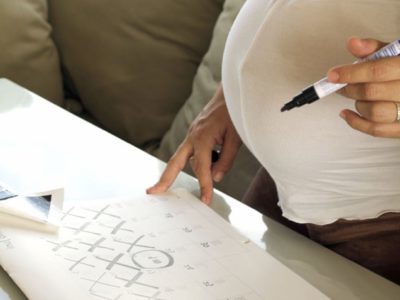
Important at 37 weeks
Attend your antenatal clinic regularly and follow all your doctor’s orders. If you don’t know which maternity hospital you will give birth in, it’s time to find out, meet the doctor, and discuss the possibility of labor pain relief.
It would be a good idea to educate yourself - learn the basic principles of breastfeeding and caring for your baby. Purchase all the necessary tools for this.
At week 37, you need to completely abandon the bandage. The baby needs time to descend closer to the entrance to the pelvis, and the bandage can hold him and delay the time of birth indefinitely.
Signs of imminent labor:
- the stomach sank, breathing became easier, heartburn tormented less often;
- the mucus plug has come off in a large clot - a colorless or yellowish clot of mucus with slight streaks of blood;
- signs of indigestion have appeared - the intestines are cleaned so that nothing interferes during childbirth.
The development of contractions or the release of amniotic fluid is the beginning of labor, and not a harbinger and indicates that it is time to go to the maternity hospital.
Sex at 37 weeks pregnant
Today, more and more modern doctors convince us that late-term sex is completely normal. But women who have already given birth more often think differently and adhere to the point of view of those specialists who still believe that before giving birth it would not hurt to give up intimate relationships. Well, why do you need at 37 weeks, although very pleasant, but still “troubles”, because after making love, questions like “Didn’t we disturb the baby?” and “When will labor start now?” If intimate relationships at 37 weeks do not bother you, do it very carefully and do not put pressure on your stomach.
Belly at 37 weeks of pregnancy: tugs, hurts, droops
If abdominal drooping did not occur in the previous week, it is quite possible that this will happen now, at 37 weeks of pregnancy. If this does not happen now, do not worry: in some cases, the stomach does not drop until the very end of pregnancy.
But if, nevertheless, the stomach drops, do not expect that labor will begin almost immediately: after the stomach drops, the woman can easily carry the baby for another 1-2 weeks. But when you inhale and exhale freely, your lowered stomach allows you to breathe easily.
But, instead of difficulty breathing, pain may appear in the lower abdomen, also affecting the lower back. Drawing, tolerably painful sensations in the lower abdomen, if such sensations are also present in the lumbar region, are one of the harbingers of childbirth, a sure sign that very soon the baby will begin his journey into a new world.
What complications can occur at 37 weeks of pregnancy?
Your baby's bones and nails continue to grow, which requires calcium. It is also necessary for the pregnant woman herself to prevent the development of hemorrhoids and varicose veins.
Equally important is the regular supply of vitamin D to the body, which will prevent the development of rickets in a child.
In addition, a woman should monitor her weight. Rapid gains are dangerous. So, if the fetus is large, this increases the risk of injury to the child during passage through the birth canal. This threatens a woman with numerous breaks.
The main danger in late pregnancy remains eclampsia. It is the leading cause of death among pregnant women worldwide. This also applies to developed countries. Eclampsia does not occur instantly; it is always preceded by preeclampsia. It is important not to ignore the first signs of impending toxicosis.
If the child is in a breech position, then at this stage it will no longer be possible to change his body position. In this case, the woman will be hospitalized until labor begins, after which the issue of a caesarean section will be decided.
Tightening or pain in the stomach at 37 weeks of pregnancy
The belly may drop at 37 weeks of pregnancy, a week earlier or a week later. If this does not happen, then do not worry. Sometimes the stomach does not drop until childbirth and this is a variant of the norm.
If your belly is drooping, this does not mean that labor should begin in the next few hours. It is quite possible that the woman will carry the child for another 1-2 weeks. However, it will become much easier for her to breathe.
Along with easier breathing comes other difficulties. Thus, pain in the lower abdomen may intensify. If the pain moves to the lower back and is cramping in nature, this may indicate the onset of labor.
Baby activity at 37 weeks of pregnancy

Your baby at this stage
At this stage of the perinatal period, the fetus is considered to be completely ready to be born. Especially if you are pregnant with many children, then this is exactly the week when you should expect the appearance of your babies. The embryo acquired flesh-colored pink skin, hair, and subcutaneous fat. The digestive tract is completely ready to adapt to the outside. The cartilage and bones have become quite strong. The baby becomes as large as possible in size, weight, and occupies all the space in the mother’s belly.
Baby's movements
When the 37th week of pregnancy arrives, the baby stops actively moving, which is due to the following reasons:
- It is large in size and occupies all the space in the mother's abdomen. This prevents him from rolling over, which reduces motor manifestations.
- The child sleeps almost all the time.
- If the mother takes soothing tea, she is at rest and barely noticeable movements are also noted.
This situation should not frighten mothers. Dangerous cases are when the fetus has completely stopped pushing or is hyperactive - you should seek help from a gynecologist. He will determine the cause of the condition and rule out pathologies.
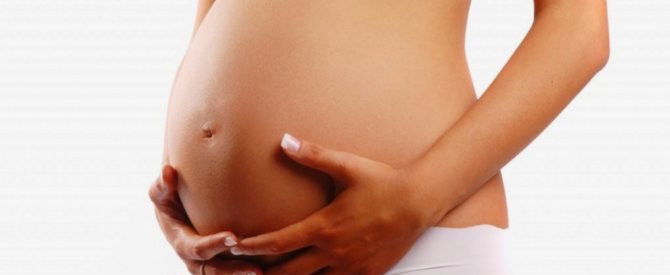
Listen carefully to your well-being and the condition of your child. If you have any concerns, contact your doctor immediately to avoid the point where the process may be irreversible.
Scheme for calculating normal fetal movements
There is a special scheme that helps mothers determine the condition of their own baby.
Doctors recommend starting the countdown from the onset of the third trimester daily, which will help track normal development and functioning. How to check:
- Time reporting must begin at 9 am.
- Enter into the table the exact time up to the minutes of the test start.
- Take into account the slightest movements, jolts, when the child turns over, kicks.
- When you have counted exactly 10 movements, write down the end time of the test.
- You may not continue the test until the next day.
Some recommendations:
- If at the 37th week of pregnancy the fetus moves little , this is not considered a sign of abnormal development, but we recommend visiting the hospital.
- When no changes occur within 1-3 hours, this may indicate that your child is resting and there is no need to worry.
- A critical case is lack of movement for 12 hours, even the smallest ones. You should immediately contact a gynecologist.
- If within 15-20 minutes you have fully counted 10 kicks, then your baby is quite active, there is no need to worry.
- When more than 10 sensations are observed in a short period of time, this can be negative.
Discharge at 37 weeks of pregnancy
Don't be alarmed if you suddenly notice a slight increase in discharge at 37 weeks of pregnancy - this is quite normal now. Also, you should not be alarmed by the presence of mucus in the discharge: this is the mucus plug being separated. Normally, stringy mucus in the discharge, if it is particles of a mucus plug, may have a whitish, pinkish or brownish tint. The cork can also separate at once - in one solid lump, reminiscent of jelly or silicone. You will definitely recognize a mucus plug: this lump has a volume of approximately 2 tablespoons, and there may be bloody streaks in the lump. Having discovered a mucus plug, you can safely go to the maternity hospital - labor will begin very soon.
If the discharge takes on an unhealthy earthy hue, the mucus resembles the consistency of purulent formations, the discharge becomes green or yellow, curdled or foamy - immediately go to the doctor for diagnosis. A change in discharge in this direction indicates the development of an infection, which must be treated before birth so as not to “share” the infection with the baby when he travels through the birth canal.
Do not hesitate to call an ambulance if you find yourself bleeding. Blood from the genital tract most often becomes a sign of detachment of a normally located placenta - placenta previa, which is also accompanied by bleeding, has probably already been ruled out after undergoing many studies and tests. Please note that placental abruption is a very dangerous phenomenon that threatens the life of the child.
Again, you should contact doctors or go to the maternity hospital if you notice the discharge of amniotic fluid. Amniotic fluid can flow out all at once - you will know about its appearance by the trickles running down your legs. Which, in fact, precede the onset of labor. But, at the same time, amniotic fluid can leak in small quantities, in portions - if the membranes are depleted or their integrity is compromised. And in this case, it is again impossible to do without the intervention of specialists: violation of the integrity of the membranes threatens intrauterine infection of the fetus.
What should you do at 37 weeks of pregnancy?
Childbirth at 37 weeks of pregnancy can begin at the most inopportune moment. Therefore, the expectant mother must be fully prepared for the long-awaited event.
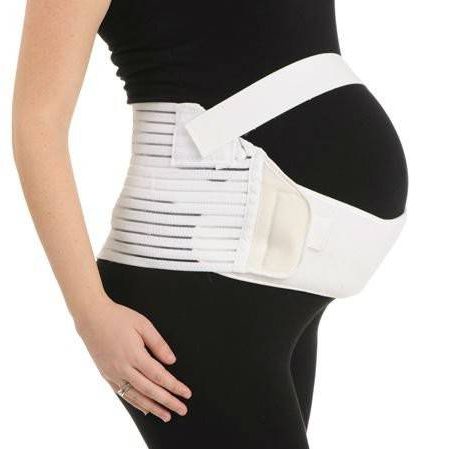
The first thing you need to do is choose a maternity hospital and agree with the doctor who will deliver the baby into the world. You can pay for your stay in the postpartum ward in advance. After all, after the birth of a child, there will be even more worries. The doctor’s phone number must be written down in several copies, and relatives must also be informed.
The 37th week of pregnancy is also suitable for packing things for the maternity hospital. The list of necessary medications can be checked with the doctor who is caring for the pregnancy. You also need to pack a separate bag with bedding, clothing and personal hygiene products. Don't forget about your camera and video camera. The first minutes of a baby’s life should definitely be captured.
You need to prepare things for the newborn in advance. You shouldn’t buy too many clothes for the maternity hospital. Babies grow very quickly. Therefore, a few blouses, caps, rompers and pairs of socks will be quite enough. Determining clothing size is very difficult for primiparous women who have begun the 37th week of pregnancy. The child’s weight and height are the main indicators from which to build. If the baby develops normally, then the expectant mother can purchase clothes for a newborn with a height of 56 cm. The same principle should be used to purchase diapers for the maternity hospital.
Immediately after birth, the baby should not be bathed completely. Full water procedures will be carried out only after the umbilical cord falls off and the wound has healed. Special wet wipes for babies will come to the rescue. You can buy them at almost any pharmacy. The maternity hospital should buy several packages of such napkins at once. They will also be useful for the mother in labor.
Sensations (movements) at 37 weeks of pregnancy
We have already said that the belly can drop at 37 weeks of pregnancy. In addition to easier breathing, you will feel that heartburn and constipation now occur less frequently. However, you have to run to the toilet more often, since the uterus puts even more pressure on the bladder. This is especially annoying at night, when it is not always possible to sleep. This is how nature prepares a woman for sleepless nights after childbirth. It is necessary to overcome insomnia and try to get enough sleep before giving birth - in the future you will need strength. To get a better night's sleep, do light work during the day and reduce your rest time if you're used to taking an hour or two of naps. Be sure to take daily short walks in the fresh air; it is very good to take a walk before bed. Do not overeat at night, and also reduce the amount of liquid consumed after 6 pm. Ventilate the room before going to bed or even leave the window open all night.
In the last stages, the woman feels a feeling of internal heat, sweats a lot, and feels stuffy all the time. All due to noticeably increased blood volumes.
The baby’s movements sometimes bring painful sensations, because he is very cramped there: there is less amniotic fluid, his size and weight increase, and the uterus seems to squeeze the baby. By the way, movement control should be carried out even at 37 weeks of pregnancy: you should feel at least 10 per day. And before birth, the baby calms down a little, his activity decreases.
Overall, the inconvenience won't last long. Very soon you will miss the baby’s movements and your own funny tummy. By the way, be sure to take a photo at 37 weeks of pregnancy for your album.
During a routine examination, the gynecologist will assess the degree to which the cervix is ready to dilate, and it is likely that after the examination you will begin to experience signs of labor.
Baby at 37 weeks
The baby's gestation period is coming to an end. Baby at 37 weeks of pregnancy
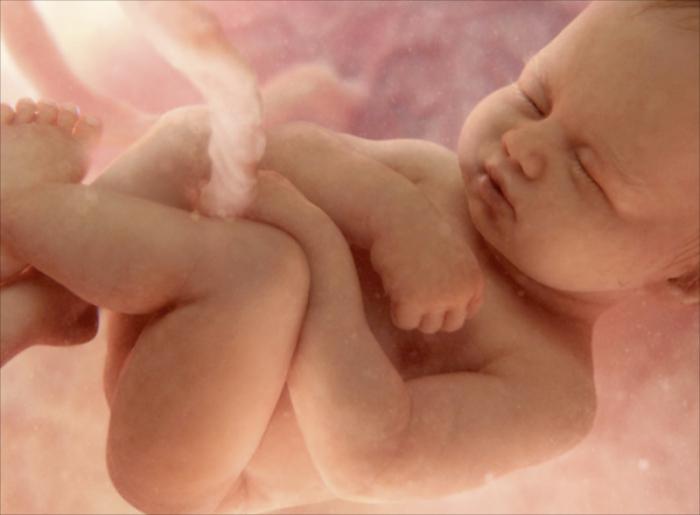
already fully prepared for birth. The small body produces hormones that prepare the newborn for existence outside the womb. The 37th week of pregnancy is the time when the necessary amount of iron accumulates in the fetal liver, which can provide the baby with blood cells during the first year of his life. During this same period, a hormone begins to be produced that is responsible for the maturation of the baby’s lungs. Special substances are also produced that help reduce the effects of stress after childbirth. This is necessary for both the baby and the mother in labor.
The 37th week of pregnancy is also characterized by the improvement of all vital systems of the fetus. Some processes will continue in subsequent weeks of pregnancy. The main ones will be completed only when the child reaches one year of age. Neurons develop rapidly and are enveloped in a special membrane that has a protective function. This is necessary for the development of coordination of movements of a small person.
The 37th week of pregnancy is also difficult for mothers. The baby's movements become more and more active. He no longer has enough space in his mother’s womb and wants to be born. But the birth process will begin only when both mother and child are ready for it. Premature birth can lead to birth injuries and non-expansion of the lungs. Therefore, the 37th week of pregnancy is not considered suitable for planned induction of labor.
Particular attention should be paid to the movements of the baby in the womb. The baby's movements can be perceived by the mother as quite painful. But the absence of tremors should be alarming. If the child does not remind himself for a long time, you should immediately consult a doctor.
The fruit also grows significantly in size. The amount of adipose tissue increases. It is quite difficult for those women who are at 37 weeks of pregnancy. The child's weight already reaches almost 3 kg. In addition, the amount of amniotic fluid and blood volume increases. The total weight gain of a woman can reach 15 kg.
Childbirth at the 37th week of pregnancy, occurring naturally, usually occurs without problems. The baby already has a good body weight, can breathe independently and suck on the mother's breast. During this period, cartilage tissue hardens. But the bones of the skull remain soft. Thanks to this, the fetus can easily pass through the mother's birth canal.
What should you be wary of at 37 weeks of pregnancy?
During a normal pregnancy, a woman should feel well even in the last stages, provided that she follows the doctor’s recommendations. But carrying a baby does not go smoothly for everyone. The presence of some symptoms may indicate the manifestation of late toxicosis. Headache, muscle twitching, and spots before the eyes should alert you. If you experience pain in the upper abdomen at 37 weeks of pregnancy, you should consult a specialist immediately.
Preeclampsia is quite dangerous in late pregnancy. This is a pathological condition that can be fatal if you do not seek medical help in a timely manner. The manifestation of gestosis may be primarily indicated by a high content of protein in the urine, as well as severe swelling of the extremities. Temperature at 37 weeks of pregnancy is also a bad sign. It can speak of both late toxicosis and the beginning of the inflammatory process.
In the later stages of gestation, all systems of the expectant mother work to their limits. This can also lead to worsening chronic diseases. A pregnant woman should be observed by a specialist in her disease and not hide alarming symptoms. Indeed, during this period it is worth taking care not only of your health, but also of the condition of the fetus. In this way, possible complications during childbirth can be avoided.
